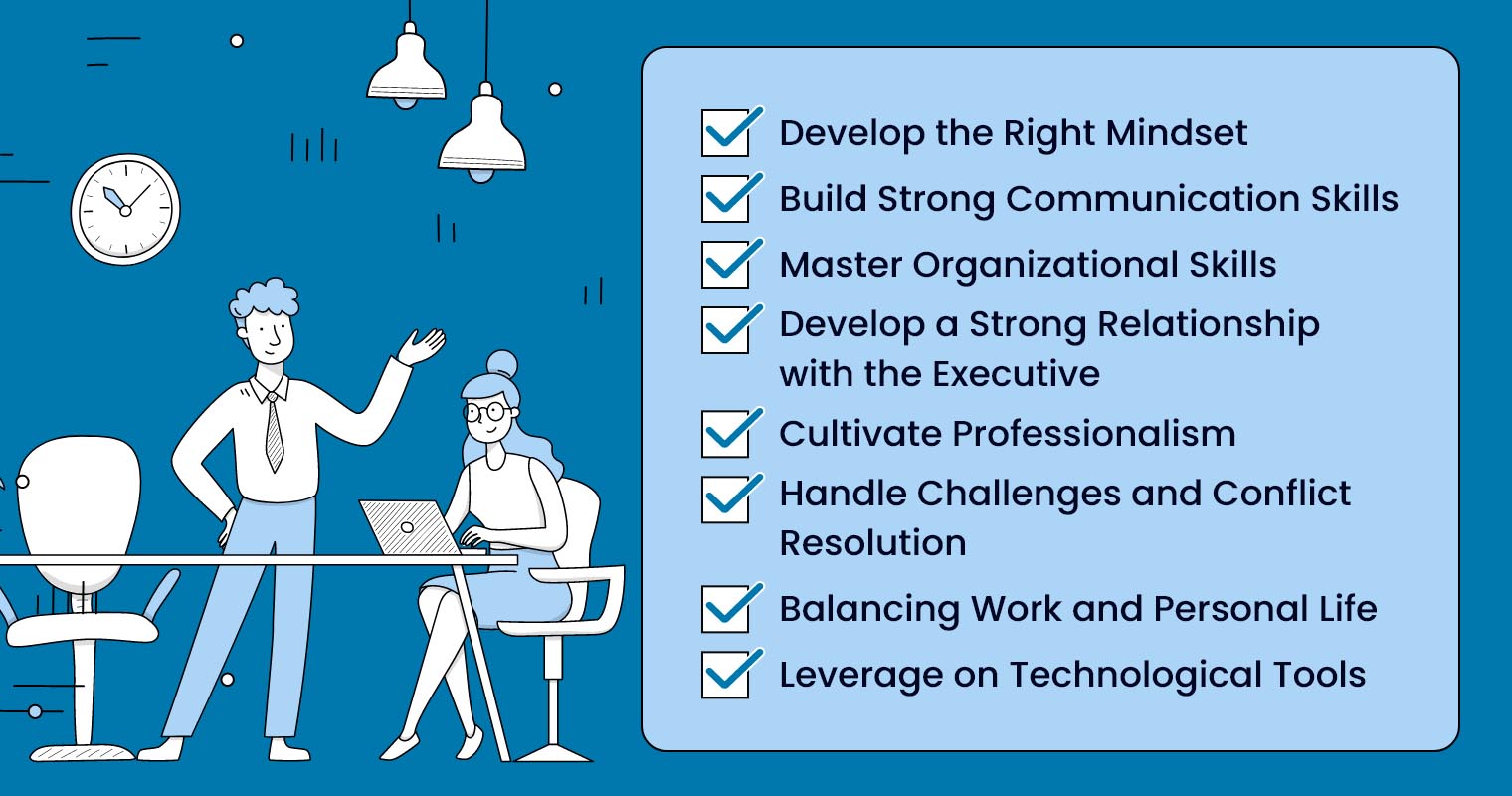Key Takeaways:
- An executive assistant handles administrative tasks, manages schedules, and coordinates with teams to support board members.
- Organization, time management, critical thinking, communication, detail-orientedness, and technological proficiency are the essential executive assistant skills.
- Mastering how to be a good executive assistant requires relevant education, software knowledge, certifications, and commitment.
- Developing the right mindset, strengthening skills, maintaining professionalism, and leveraging technology to enhance efficiency are some of the effective executive assistant tips.
Faced with the overwhelming day-to-day demands of running a company, having an assistant has become more of a must rather than an option for leaders. But what is an executive assistant and what do they do? They serve a crucial role in assisting executives and are essential in alleviating some of the executives’ work to help them focus on more important organizational responsibilities. Suffice it to say, they are an integral part of how the boardroom operates.
What Does an Executive Assistant Do?
As their job title suggests, being an executive assistant entails aiding executives or board members by taking on administrative responsibilities such as answering emails, scheduling meetings, coordinating between teams, and other administrative tasks. They are trained to cater to their boss’ needs to help them perform at their optimal level. Since members of the upper management are usually preoccupied with meetings, decision-making, and other heavy tasks, executive assistant skills can be an amazing leverage in getting the work done, which can result in better output quality.
Executive assistants themselves understand that they have a lot on their plate. To fulfill their job, and manage the demanding everyday work, they require certain characteristics to excel.
What are the Skills Needed for Executive Assistants
Some may underestimate the skills needed how to be an executive assistant, thinking the job does not require much experience. When in fact, it is a job that necessitates grit, quick thinking, and organization. Below is a list of essential executive assistant skills:

Organizational Skills
The number of tasks executive assistants have on hand and all the scheduling they need to do make it apparent that this is a top skill they need to possess. Executives usually need to meet several individuals daily whose schedules are probably just as hectic as theirs. This is why it is important for executive assistants to be organized and ensure that these executives do not miss any of their scheduled meetings.
Moreover, since executives have limited time, they need to have information or materials ASAP. It would be easier for executive assistants to give what their boss needs when materials are organized and they immediately know where to look.
Time Management
With the number of tasks executive assistants need to accomplish within the day, they must know how to budget their time. In conjunction with this, they need to have a strong sense of which task to prioritize to ensure that there will be no delays and the quality of outputs is not sacrificed.
Multitasking
As an executive assistant, it is a great advantage to know how to multitask especially if deadlines are tight. The unpredictable nature of the job means tasks, issues, or other concerns can also spring up at any time. Thus, being quick on their feet to attend to multiple urgent matters at hand is definitely an edge.
Critical Thinking
Similar to their bosses, executive assistants are also placed in positions where they have to make decisions or find workarounds to sudden issues. Despite being pressured to act on these immediately, executive assistants should be able to quickly analyze what the situation calls for and provide the best response.
Communication Skills
Executives have to cascade and communicate with numerous individuals or groups, both orally and in writing, which can be overwhelming, particularly given their busy schedules. To relieve them of this burden, executive assistants are entrusted to stay on top of these via emails or memos on behalf of the executives.
It is expected for assistants to have a good grasp of the right vocabulary and tone to use when communicating with different people, under a variety of circumstances.
Social Skills
Executive assistants need to be able to establish a well-built relationship with their bosses in order to serve them well. Aside from that, being an executive assistant also requires interacting and dealing with individuals from all business levels, as well as from all walks of life. Hence, it would be beneficial for them to know how to easily build rapport. Furthermore, having connections may also come in handy in the future.
Detail-Oriented
A bulk of an executive assistant’s job involves clerical or administrative work which requires keen attention to detail. Filing, entering data, and scheduling flights are just some of these administrative tasks. Being imprecise or careless can result in not only a missed meeting but also, potentially, bigger business impacts.
Composure
There is no denying that executive assistants are often subjected to stressful situations especially when there are unforeseen issues — a missed flight, overlapping schedules, or unavailability of resources. In these times, an executive assistant should not be overcome with panic and instead be headstrong in handling the situation.
Technology Skills
With time constraints a constant in being an executive assistant, it is important that they know the latest technology that can ease their workload. As an ever-evolving industry, technology is also consistently churned out which companies adopt. Thus, executive assistants also need to be open-minded and quick learners to be able to keep up.
How to Be an Executive Assistant
Just like any other job, being an executive assistant requires you to have at least the right education, experience, and knowledge of common software, such as Microsoft Office. Although some companies are not particular about executive assistants having a degree, it would still be advantageous for you to, not only know the best tips for executive assistants but also have taken courses relevant to the position. Bookkeeping, Business Administration, and Business Communication are just some of the courses you can take as an aspiring executive assistant. Others even get a certification or ask their peers for executive assistant tips to enhance their skills and connections.
Understanding the role of an executive assistant is critical. It can be a challenging role, especially with the amount of workload and range of tasks that need to be done. Without full commitment, one might decide to wave the white flag early.
Best Practices for Executive Assistants
Anyone can be an executive assistant, as long as they have the required skills and experience. However, what takes extra effort that can set someone apart from others in such a competitive field is knowing how to be a good executive assistant. This can be achieved through having knowledge of executive assistant best practices.

1. Develop the Right Mindset
In order for one to do well, they need to be in the right mood and mindset. Executive assistants should come to work ready to tackle tasks with the bigger picture in mind. With this mindset, they are able to prioritize and build a structure that would best get them to the end goal. This allows them to come up with a better strategy to get everything done.
2. Build Strong Communication Skills
As discussed, communicating with various individuals is a constant in this field, so having great communication skills is indispensable. Brush up on your business writing skills and elevate your vocabulary to know how you can professionally deliver your thoughts.
3. Master Organizational Skills
Being organized is probably a minimum requirement for knowing how to be a good executive assistant. It would save you from stressing over locating files and emails, especially on occasions when your boss asks for something urgent. Having exemplary organizational skills also allows you to properly monitor your work and minimize errors.
4. Develop a Strong Relationship with the Executive
As an executive assistant, you will be with your boss for the most part of the day and so, it is only natural to develop a strong bond. Get to know your boss’ preferences, goals, and working style to be able to deliver or do your job accordingly. Knowing them well also makes it easier to act on their behalf.
5. Cultivate Professionalism
You need to keep in mind that how you are as an executive assistant is also a reflection of your boss. Thus, it is important to conduct yourself professionally, especially in circumstances that call for it. To help you better engage your professionalism as an executive assistant, a great way to upskill is by enrolling in courses or getting the necessary training.
6. Handle Challenges and Conflict Resolution
Working closely with an executive has its perks and downsides — conflicts and a parade of challenges. These may include working late hours, juggling between urgent tasks, or even disagreements with your boss. In such situations, it is important to first of all, take a deep breath and maintain composure. You will not get anything done if your mind is clouded by emotions or preoccupied with panic. Once you have cleared your mind, it is easier to assess the situation and amicably face the challenge or conflict head-on.
7. Balancing Work and Personal Life
An advice any individual in the workforce would probably give is to have a work-life balance. Yes, there are going to be some days that you will have to work late, but on days where you can be out on the dot, savor it and do something for yourself. Moreover, it is important to take a leave every once in a while, to avoid burnout. It would serve you or your boss no good if you are not mentally or physically capable of doing your job. At the end of the day, you are human too who has limits.
8. Leverage Technological Tools
With the amount of work an executive assistant has to do, it would be a waste to not take advantage of technology that can automate processes. In the digital era, it is a must to always be open to learning new technology especially those that are pertinent to your company’s industry. Some of these tools that are great to be familiar with include travel booking apps, digital calendars, project management tools, video conferencing apps, board portal software, etc.
How a Board Portal Can Help Executive Assistants
An executive assistant does all the assisting but who assists them through the whirlwind of tasks and schedules? Technology can be the perfect partner in making the job more manageable, especially in relieving strenuous administrative tasks. With board portal software, preparing, holding, and scheduling meetings for executives can be done quicker within one platform. By optimizing your process with a board portal, executive assistants can sort through mundane tasks quicker to focus on more pressing and urgent matters.
Convene is an award-winning board portal software built for executive assistants, administrators, and board directors to help streamline their tasks, processes, and responsibilities. With such board portal software, executive assistants can do away with the hassle of manually collating documents for the meeting pack, scheduling the meeting, and sending invitations. Materials can also be stored in a centralized location thereby eliminating the need to open multiple applications.
Get ahead of your tasks and strive to be a successful executive assistant! See how Convene can help with board management and administrative tasks. Start your free trial of Convene today!
Louise is a Proposal Writer at Convene. Her enthusiasm for writing coupled with her experience working for IT organizations has aided her in creating content on digitalization, board portals, and virtual meetings. Aware of the IT field’s ever-growing nature, she aims to broaden her scope and cover more topics that bridge technology and businesses.











